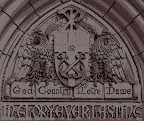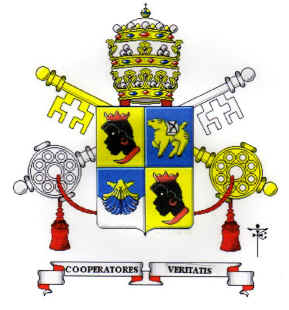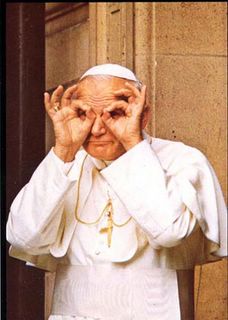Apr. 24 (CWNews.com) - This is the text of the homily delivered by Pope Benedict XVI at the Mass formally inaugurating his pontificate on Sunday, April 24 in St. Peter's Square. Your Eminences, my dear brother bishops and priests, distinguished authorities and members of the diplomatic corps, dear brothers and sisters. During these days of great intensity, we have chanted the litany of the saints on three different occasions: at the funeral of our Holy Father John Paul II; as the cardinals entered the conclave; and again today, when we sang it with the response: Tu illum adiuva-- sustain the new successor of St. Peter. On each occasion, in a particular way, I found great consolation in listening to this prayerful chant.
How alone we all felt after the passing of John Paul II-- the Pope who for over 26 years had been our shepherd and guide on our journey through life! He crossed the threshold of the next life, entering into the mystery of God. But he did not take this step alone. Those who believe are never alone-- neither in life nor in death. At that moment, we could call upon the saints from every age-- his friends, his brothers and sisters in the faith-- knowing that they would form a living procession to accompany him into the next world, into the glory of God. We knew that his arrival was awaited. Now we know that he is among his own and is truly at home. We were also consoled as we made our solemn entrance into conclave, to elect the one whom the Lord had chosen. How would we be able to discern his name? How could 115 bishops, from every culture and every country, discover the one on whom the Lord wished to confer the mission of binding and loosing? Once again, we knew that we were not alone, we knew that we were surrounded, led and guided by the friends of God.
And now, at this moment, weak servant of God that I am, I must assume this enormous task, which truly exceeds all human capacity. How can I do this? How will I be able to do it? All of you, my dear friends, have just invoked the entire host of saints, represented by some of the great names in the history of God's dealings with mankind. In this way, I too can say with renewed conviction: I am not alone.
I do not have to carry alone what in truth I could never carry alone. All the saints of God are there to protect me, to sustain me and to carry me. And your prayers, my dear friends, your indulgence, your love, your faith and your hope accompany me. Indeed, the communion of saints consists not only of the great men and women who went before us and whose names we know. All of us belong to the communion of saints, we who have been baptized in the name of the Father, and of the Son, and of the Holy Spirit, we who draw life from the gift of Christ's Body and Blood, through which He transforms us and makes us like Himself. Yes, the Church is alive: this is the wonderful experience of these days. During those sad days of the Pope's illness and death, it became wonderfully evident to us that the Church is alive. And the Church is young. She holds within herself the future of the world and therefore shows each of us the way towards the future. The Church is alive and we are seeing it: we are experiencing the joy that the Risen Lord promised His followers. The Church is alive-- she is alive because Christ is alive, because He is truly risen. In the suffering that we saw on the Holy Father's face in those days of Easter, we contemplated the mystery of Christ's Passion and we touched His wounds. But throughout these days we have also been able, in a profound sense, to touch the Risen One. We have been able to experience the joy that He promised, after a brief period of darkness, as the fruit of His resurrection. The Church is alive-- with these words, I greet with great joy and gratitude all of you gathered here, my venerable brother cardinals and bishops, my dear priests, deacons, Church workers, catechists. I greet you, men and women religious, witnesses of the transfiguring presence of God. I greet you, members of the lay faithful, immersed in the great task of building up the Kingdom of God which spreads throughout the world, in every area of life. With great affection I also greet all those who have been reborn in the sacrament of Baptism but are not yet in full communion with us; and you, my brothers and sisters of the Jewish people, to whom we are joined by a great shared spiritual heritage, one rooted in God's irrevocable promises. Finally, like a wave gathering force, my thoughts go out to all men and women of today, to believers and non-believers alike. Dear friends! At this moment there is no need for me to present a program of governance. I was able to give an indication of what I see as my task in my message of Wednesday April 20, and there will be other opportunities to do so. My real program of governance is not to do my own will, not to pursue my own ideas, but to listen, together with the whole Church, to the word and the will of the Lord, to be guided by Him, so that He Himself will lead the Church at this hour of our history. Instead of putting forward a program, I should simply like to comment on the two liturgical symbols which represent the inauguration of the Petrine Ministry; both these symbols, moreover, reflect clearly what we heard proclaimed in today's readings. The first symbol is the pallium, woven in pure wool, which will be placed on my shoulders. This ancient sign, which the bishops of Rome have worn since the 4th century, may be considered an image of the yoke of Christ, which the bishop of this city, the Servant of the Servants of God, takes upon his shoulders. God's yoke is God's will, which we accept. And this will does not weigh down on us, oppressing us and taking away our freedom. To know what God wants, to know where the path of life is found: this was Israel's joy, this was her great privilege. It is also our joy: God's will does not alienate us, it purifies us-- even if this can be painful-- and so it leads us to ourselves. In this way, we serve not only Him, but the salvation of the whole world, of all history. The symbolism of the pallium is even more concrete: the lamb's wool is meant to represent the lost, sick or weak sheep which the shepherd places on his shoulders and carries to the waters of life. For the Fathers of the Church, the parable of the lost sheep, which the shepherd seeks in the desert, was an image of the mystery of Christ and the Church. The human race-- every one of us-- is the sheep lost in the desert which no longer knows the way. The Son of God will not let this happen; He cannot abandon humanity in so wretched a condition. He leaps to his feet and abandons the glory of heaven, in order to go in search of the sheep and pursue it, all the way to the Cross. He takes it upon His shoulders and carries our humanity; He carries us all-- He is the good shepherd who lays down His life for the sheep.
What the pallium indicates first and foremost is that we are all carried by Christ. But at the same time it invites us to carry one another. Hence the pallium becomes a symbol of the shepherd's mission, of which the second reading and the Gospel speak. The pastor must be inspired by Christ's holy zeal: for him it is not a matter of indifference that so many people are living in the desert. And there are so many kinds of desert. There is the desert of poverty, the desert of hunger and thirst, the desert of abandonment, of loneliness, of destroyed love. There is the desert of God's darkness, the emptiness of souls no longer aware of their dignity or the goal of human life. The external deserts in the world are growing, because the internal deserts have become so vast. Therefore the earth's treasures no longer serve to build God's garden for all to live in, but they have been made to serve the powers of exploitation and destruction. The Church as a whole and all her pastors, like Christ, must set out to lead people out of the desert, towards the place of life, towards friendship with the Son of God, toward the One who gives us life, and life in abundance. The symbol of the lamb also has a deeper meaning. In the ancient Near East, it was customary for kings to style themselves shepherds of their people. This was an image of their power, a cynical image: to them their subjects were like sheep, which the shepherd could dispose of as he wished. When the shepherd of all humanity, the living God, Himself became a lamb, He stood on the side of the lambs, with those who are downtrodden and killed. This is how He reveals Himself to be the true shepherd: 'I am the Good Shepherd… I lay down my life for the sheep,' Jesus says of Himself (Jn 10:14ff). It is not power, but love that redeems us! This is God's sign: He Himself is love.
How often we wish that God would make show Himself stronger, that He would strike decisively, defeating evil and creating a better world. All ideologies of power justify themselves in exactly this way, they justify the destruction of whatever would stand in the way of progress and the liberation of humanity. We suffer on account of God's patience. And yet, we need His patience. God, Who became a lamb, tells us that the world is saved by the Crucified One, not by those who crucified Him. The world is redeemed by the patience of God. It is destroyed by the impatience of man. One of the basic characteristics of a shepherd must be to love the people entrusted to him, even as he loves Christ whom he serves. "Feed my sheep," says Christ to Peter, and now, at this moment, He says it to me as well. Feeding means loving, and loving also means being ready to suffer. Loving means giving the sheep what is truly good, the nourishment of God's truth, of God's word, the nourishment of His presence, which He gives us in the blessed Sacrament. My dear friends-- at this moment I can only say: pray for me, that I may learn to love the Lord more and more. Pray for me, that I may learn to love His flock more and more-- in other words, you, the holy Church, each one of you and all of you together. Pray for me, that I may not flee for fear of the wolves. Let us pray for one another, that the Lord will carry us and that we will learn to carry one another. The second symbol used in today's liturgy to express the inauguration of the Petrine ministry is the presentation of the Fisherman's Ring. Peter's call to be a shepherd, which we heard in the Gospel, comes after the account of a miraculous catch of fish: after a night in which the disciples had let down their nets without success, they see the Risen Lord on the shore. He tells them to let down their nets once more, and the nets become so full that they can hardly pull them in; 153 large fish: "and although there were so many, the net was not torn." (Jn 21:11) This account, coming at the end of Jesus' earthly journey with His disciples, corresponds to an account found at the beginning: there too, the disciples had caught nothing the entire night; there too, Jesus had invited Simon once more to put out into the deep. And Simon, who was not yet called Peter, gave the wonderful reply: "Master, at your word I will let down the nets."
And then came the conferral of his mission: "Do not be afraid. Henceforth you will be catching men." (Lk 5:1-11) Today too the Church and the successors of the apostles are told to put out into the deep sea of history and to let down the nets, so as to win men and women over to the Gospel-- to God, to Christ, to true life. The Fathers made a very significant commentary on this singular task. This is what they say: for a fish, created for water, it is fatal to be taken out of the sea, to be removed from its vital element to serve as human food. But in the mission of a fisher of men, the reverse is true. We are living in alienation, in the salt waters of suffering and death; in a sea of darkness without light. The net of the Gospel pulls us out of the waters of death and brings us into the splendor of God's light, into true life. It is really true: as we follow Christ in this mission to be fishers of men, we must bring men and women out of the sea that is salted with so many forms of alienation and onto the land of life, into the light of God. It is really so: the purpose of our lives is to reveal God to men. And only where God is seen does life truly begin. Only when we meet the living God in Christ do we know what life is. We are not some casual and meaningless product of evolution. Each of us is the result of a thought of God. Each of us is willed, each of us is loved, each of us is necessary. There is nothing more beautiful than to be surprised by the Gospel, by the encounter with Christ. There is nothing more beautiful than to know Him and to speak to others of our friendship with Him. The task of the shepherd, the task of the fisher of men, can often seem wearisome. But it is beautiful and wonderful, because it is truly a service to joy, to God's joy which longs to break into the world. Here I want to add something: both the image of the shepherd and that of the fisherman issue an explicit call to unity. "I have other sheep that are not of this fold; I must lead them too, and they will heed my voice. So there shall be one flock, one shepherd." (Jn 10:16) These are the words of Jesus at the end of His discourse on the Good Shepherd. And the account of the 153 large fish ends with the joyful statement: "although there were so many, the net was not torn." (Jn 21:11) Alas, beloved Lord, with sorrow we must now acknowledge that it has been torn! But no-- we must not be sad! Let us rejoice because of Your promise, which does not disappoint, and let us do all we can to pursue the path toward the unity You have promised. Let us remember it in our prayer to the Lord, as we plead with Him: Yes, Lord, remember Your promise. Grant that we may be one flock and one shepherd! Do not allow Your net to be torn, help us to be servants of unity! At this point, my mind goes back to October 22 1978, when Pope John Paul II (bio - news) began his ministry here in Saint Peter's Square. His words on that occasion constantly echo in my ears: "Do not be afraid! Open wide the doors for Christ!" The Pope was addressing the mighty, the powerful of this world, who feared that Christ might take away something of their power if they were to let Him in, if they were to allow the faith to be free. Yes, He would certainly have taken something away from them: the dominion of corruption, the manipulation of law and the freedom to do as they pleased. But He would not have taken away anything that pertains to human freedom or dignity, or to the building of a just society.
The Pope was also speaking to everyone, especially the young. Are we not perhaps all afraid in some way? If we let Christ enter fully into our lives, if we open ourselves totally to Him, are we not afraid that He might take something away from us? Are we not perhaps afraid to give up something significant, something unique, something that makes life so beautiful? Do we not then risk ending up diminished and deprived of our freedom? And once again the Pope said: No! If we let Christ into our lives, we lose nothing, nothing, absolutely nothing of what makes life free, beautiful, and great.
No! Only in this friendship are the doors of life opened wide. Only in this friendship is the great potential of human existence truly revealed. Only in this friendship do we experience beauty and liberation. And so, today, with great strength and great conviction, on the basis of long personal experience of life, I say to you, dear young people: Do not be afraid of Christ! He takes nothing away, and He gives you everything. When we give ourselves to Him, we receive a hundredfold in return. Yes, open, open wide the doors to Christ-- and you will find true life. Amen.
Found at Catholic World News


















